Players create student organization to continue discussions
When she was a Rollins student, Kourtnie Berry (‘12) was a shooting guard for Women’s Basketball, grabbing two Sunshine State Conference (SSC) titles and advancing to the NCAA Final Four. Berry has been an assistant coach for five years and counting, and she mentors her players on and off the court.
Yet her identity encompasses much more than her accomplishments at Rollins.
“I remember walking on campus my first day, sitting in my first class, walking out, and calling my mom immediately. I said, ‘Mom, I don’t know if I can make it here.’ I was the only Black student in the class,” Berry said.
Although, according to Berry, Rollins diversity has since come a long way, the Apopka native could not ignore the background differences between her and her peers. She set off to find, or rather create, a community around her.
“I didn’t even know who I wanted to be seen as,” Berry said. “As a young female Black athlete, I feel like a lot of the time we are so invisible. It took me [a long time] to realize I want my [students] to be seen. And I want them to be heard.”
The murder of George Floyd launched a summer in which people of color finally began to receive the respect and the attention they deserved. Berry refused to do nothing during this crucial time, and, together with the rest of the coaching staff, she created a series of learning opportunities for student-athletes.
The players wrote to their state representatives, educated themselves on the differences between systemic and systematic racism, watched documentaries, and engaged in deep conversations that Berry described as “emotionally intense, especially in terms of our Black student athletes sharing their experiences.”
She was in awe of her players’ ability to have these conversations at a time when adults struggled with coexistence and intelligently voicing their opinions.
“Our kids have been very vulnerable. They have been very loving, very accepting, especially our Black student athletes and their peers acting as allies,” Berry said. “I was blown away by their ability to be sensitive, aware, and most importantly, self-aware.”
The sentiment is shared by the Center for Inclusion and Campus Involvement (CICI), which has organized safe spaces for staff members to engage in small, interactive anti-racism groups.
Berry said, “Our facilitator has done a great job bringing people who are so similar, yet so different, and encouraging us to have an open dialogue. I am also so grateful for the work of Abby Hollern, Robert Whetstone, Jade Taylor, and their offices.”
Women’s Basketball is one of the most diverse teams at Rollins, and Berry recognizes the role that affordability and demographics of the sport plays in this. Although the team was among the most proactive in terms of advocacy, it also recognized that more needed to be done.
Berry joined Coaches 4 Change (C4C), an organization founded by college basketball coaches dedicated to helping their student-athletes, campuses, and communities. The mission of C4C is to provide a platform that engages, educates, empowers, and evolves collegiate student-athletes on issues of social injustice, systemic racism, and the power of voting in the endless pursuit of equality.
Berry said, “The overwhelming support that I received from my family, our athletic director Pennie Parker, and my players was just amazing. As a mentor, especially as a woman of color, I feel like if I can’t teach my kids and serve them and develop them into fabulous human beings, who will?”
Berry insisted that the only way lasting change was going to happen was by starting with her own team, then athletic staff, then Rollins as a whole. She said, “I can’t go and change the world if I can’t change my immediate environment.”
Soon thereafter, student-athletes approached Berry with the idea of a student organization dedicated to the same goals. Athletes 4 Change (A4C) is in the process of formation and includes members from Women’s Basketball, Women’s Soccer, Men’s Soccer, Volleyball, Softball, Swimming, and others.
The advisors include Berry, as well as Assistant Women’s Golf Coach Devanshi Naik and Assistant Women’s Tennis Coach Tasi Purcell Batista (‘07).
“They’re two outstanding women of color,” said Berry. “I’ve leaned on them for so much and appreciate them completely.”
Though always happy to provide guidance, Berry said she enjoys sitting back and observing these influential members of the student body take off and work hard.
She also praised the creativity with which the athletes handled the COVID-19 hiatus and the competitive drive and innovation that came from it.
“I know there’s a lot of work to do and it’s not going to be done overnight,” said Berry. “It’s one of those things that’s going to take time. As a community, as a campus, as people, the thing we need to remember is that, if we can’t do anything else, we can love each other.”
The greatest form of love is service, a lesson she drew from her parents, who not only encouraged her on that first day, but who still come to her players’ games. Berry singled them out with gratitude as role models.
She tells recruits that if they are not comfortable with her telling them that they can do anything in this world or that they need to use their platform to be strong and be who they are, then Rollins may not be the place for them.
Berry said, “I am so profoundly moved by all our student-athletes every day. The A4C student-athletes are special, and it brings me joy to know that I get to work alongside these kids who are going to change the world. They are very special. We have some great things that are going to happen, and I am very hopeful.”


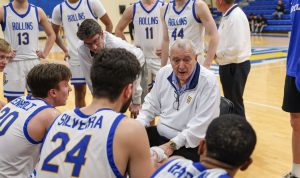
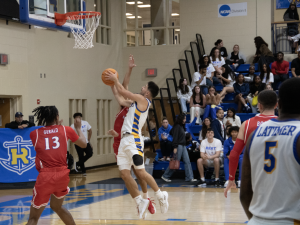
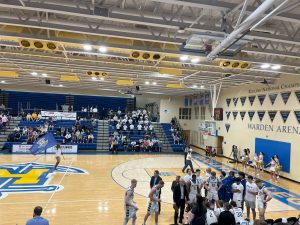

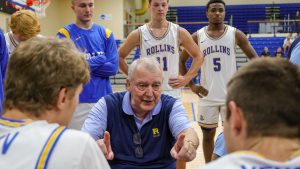








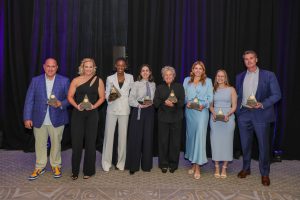
Comments are closed.